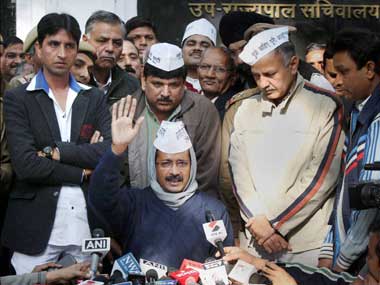 New Delhi, Dec 31: After fulfilling his party's promise of providing free supply of 700 litres of water everyday for Delhi households, Chief Minister Arvind Kejriwal on Tuesday initiated steps to reduce power bills by asking the three private power distribution companies to present their case on their likely audit by the Comptroller and Auditor General.
New Delhi, Dec 31: After fulfilling his party's promise of providing free supply of 700 litres of water everyday for Delhi households, Chief Minister Arvind Kejriwal on Tuesday initiated steps to reduce power bills by asking the three private power distribution companies to present their case on their likely audit by the Comptroller and Auditor General.
According to reports, Chief Minister has given time till Wednesday morning to the three major power distribution companies to file their replies in this regard.
Defying doctor's advice, an unwell Chief Minister Kejriwal also went to meet CAG Shashi Kant Sharma to discuss the issue before going into a cabinet meeting.
Kejriwal told reporters, “Delhi government is of the view that audit of these companies can be done. But under the provisions of law the three companies were being given the opportunity of being heard on the government audit of their finances.”
"They are being given time till tomorrow morning by which they will have to give their representations. The cabinet will meet in the evening," he told reporters before leaving for his meeting with the CAG.
At the cabinet meeting today, the issue of revising the power tariff may be discussed. The Chief Minister said in today's cabinet meeting, they would discuss issues relating to unauthorised colonies.
The ailing Chief Minister, who has been advised complete bed rest by the doctors, also tweeted, “Going to meet the CAG, to discuss possibility of an audit of the three power companies.”
“I believe we have 48 hours in hand so doing whatever we can to help people in this period, “ the Chief Minister's tweet said.
After the AAP government delivered on its promise of supplying 700 litres of free water everyday for Delhi households, expectations are running high whether the ruling party would be able to deliver on its promise of reducing the power tariff by 50 percent in the national capital.
Kejriwal on Monday delivered on the AAP's poll promise by announcing 20 kilo litres of free water a month to all metered households. The Congress, however, questioned the move, saying Kejriwal should ensure that every citizen of Delhi gets 700 litres of free water per day.
The government's decision, however, came with a rider that those consuming over this limit will have to pay as per tariff, enhanced by 10 percent, effective January 1.
The promise of 700 litres of free water to every Delhi household was made in the AAP poll manifesto.
Ever since Kejriwal formed AAP, he has been focusing his Delhi campaign on reducing power tariff and free water supply. Experts say that reducing electricity tariffs by 50 percent can only be done only if subsidies are doled out.
“It is unlikely that the utilities can bring down the electricity tariffs by 50 percent without government providing them with cash subsidy,” Debashish Mishra, Senior Director, Deloitte India said.
However, he added that there may be scope for further loss reduction in distribution, demand side management measures and cost optimisation in O&M (Operation & Maintenance).
He said that broadly the tariff is determined by four factors - existing operational efficiencies, capital and cost structures, power purchase agreements, and regulatory (assured and authorised) assets in the sector.
Electricity tariffs were revised in the Capital in July this year. Delhiites pay a minimum of Rs 3.90 per unit tariff.
AAP has said that it would seek complete statehood for Delhi, special audit of all electricity companies, regularisation of unauthorised colonies, stopping donations in private schools and improving working conditions of contract labour and lowly paid employees.





Comments
Add new comment